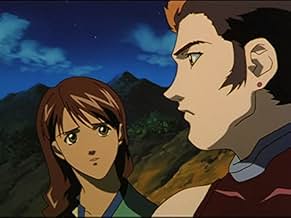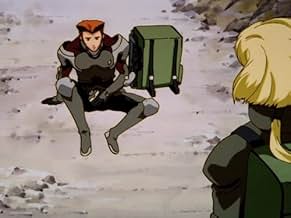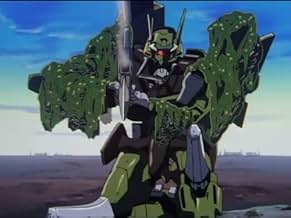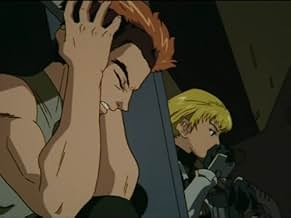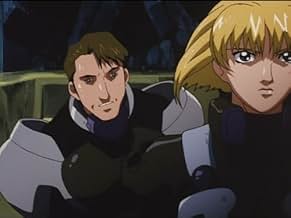AVALIAÇÃO DA IMDb
7,1/10
1,4 mil
SUA AVALIAÇÃO
O ano é 2031 e, depois de dormir no frio por 22 anos, Yuji Kaido acorda no meio de uma guerra pela sobrevivência humana contra os insetos gigantes chamados Blues, que invadiram a Terra e mat... Ler tudoO ano é 2031 e, depois de dormir no frio por 22 anos, Yuji Kaido acorda no meio de uma guerra pela sobrevivência humana contra os insetos gigantes chamados Blues, que invadiram a Terra e mataram quase toda a população.O ano é 2031 e, depois de dormir no frio por 22 anos, Yuji Kaido acorda no meio de uma guerra pela sobrevivência humana contra os insetos gigantes chamados Blues, que invadiram a Terra e mataram quase toda a população.
Explorar episódios
Avaliações em destaque
I've seen a lot of anime, this is by far the darkest, most disturbing anime I have ever seen. It's great!! When I first saw the trailer for Blue Gender I got goosebumps. It's really a fantastic series that has twists and turns around every corner that leaves you wondering what's going to happen next. The voices are dark and haunting, the music is dark and scary. FUNimation did a fantastic job with this. With the voices of Eric Vale (DBZ's Future Trunks) and Laura Bailey (Kid Trunks, Keiko Ukimura). Word to the wise: Don't get too attached to any character, because there aren't any Dragonballs to bring them back. I got attached to a few characters that were killed off pretty quick. I wasn't happy. Also, the voice actors speak very low, so you might need to turn the volume up, but that captures the darkness about it. All in all Blue Gender is a very unique and dark series that any anime fan would love.
I'm not really a big anime guy; in fact, the genre as a whole sort of repulses me. Blue Gender really only piqued my interest because it was on Adult Swim's lineup around two, three years ago (back when AS was worth watching) and I caught a couple episodes. I'm a total sucker for post-apocalyptic scenarios, and giant, mutilating bugs never hurt anything, so I recently got hold of the series in complete. 36 hours later, I'd watched the series from beginning to end; not so much because it was gripping (that's only partially true), but more because I'm a maniac.
Blue Gender is driven not by the prototypical giant robot action Japan is (in)famous for, nor the horrendous monsters, nor even, for that matter, the dialog. The viewer is compelled through Blue Gender by the characters and their subsequent emotional arrangements, more specifically the leads, Yugi and Marlene. It's basically an epic, sci-fi soap opera with heavy metal and big bugs.
Marlene is the ideal woman. (Yeah yeah, she's a cartoon, "ew gross", get over it: that's not the point. The point is the idea being conveyed by whatever layered ink it travels through:) Marlene portrays the aesthetic of an ideal woman: strong, self-sufficient, but irrevocably feminine. I'd argue that she's more of a focal point for the viewer than Yugi, but Yugi is also a necessary component.
Yugi is a bumbling, sometimes whiny character that often accomplishes incredible things. This the viewer can appreciate and identify with; his relationship with Marlene, because of the viewer's identification with him, is the key in the ignition for this work. The audience is propelled through the series hoping intensely he'll get himself together and snag this pristine idol of a woman.
The interactions that follow the setup between these two are worth the 500-whatever minutes of moderate quality animation and dialog.
The other characters, for the most part, are semi-interesting. Some, however, are notable (eg, Dice). The atmosphere and setting are kind of cool; the creators do a pretty good job of portraying an insect infested planet Earth, but again, this is mostly beside the point.
In this ultimately lonely life, people often underwhelm us. I'm constantly disappointed by the trite selection of people placed before me. Fiction provides a remedy to this, allowing us to construct a composite ideal of characters we'd like to know within the stage of our minds. After all, the only difference between memory and reality is the level of detail.
Anyways, philosophic drooling out of the way, I'm glad to say that this series instilled in me memories of a character I appreciate, and I'd endure double the length of these episodes, spotty details and all, just to glean what I have.
On an end, this series has softened my harsh glare towards cartoons. While I doubt I'll be browsing the Anime section anytime soon, I'm a bit more open to taking animation for the ideas it's portraying as opposed to the raw, intrinsic value of the animation itself.
Oh, also, keep a keen eye out for the hilarious Engrish used in the animated computer interfaces... "Meesuement Impossibility!".
Blue Gender is driven not by the prototypical giant robot action Japan is (in)famous for, nor the horrendous monsters, nor even, for that matter, the dialog. The viewer is compelled through Blue Gender by the characters and their subsequent emotional arrangements, more specifically the leads, Yugi and Marlene. It's basically an epic, sci-fi soap opera with heavy metal and big bugs.
Marlene is the ideal woman. (Yeah yeah, she's a cartoon, "ew gross", get over it: that's not the point. The point is the idea being conveyed by whatever layered ink it travels through:) Marlene portrays the aesthetic of an ideal woman: strong, self-sufficient, but irrevocably feminine. I'd argue that she's more of a focal point for the viewer than Yugi, but Yugi is also a necessary component.
Yugi is a bumbling, sometimes whiny character that often accomplishes incredible things. This the viewer can appreciate and identify with; his relationship with Marlene, because of the viewer's identification with him, is the key in the ignition for this work. The audience is propelled through the series hoping intensely he'll get himself together and snag this pristine idol of a woman.
The interactions that follow the setup between these two are worth the 500-whatever minutes of moderate quality animation and dialog.
The other characters, for the most part, are semi-interesting. Some, however, are notable (eg, Dice). The atmosphere and setting are kind of cool; the creators do a pretty good job of portraying an insect infested planet Earth, but again, this is mostly beside the point.
In this ultimately lonely life, people often underwhelm us. I'm constantly disappointed by the trite selection of people placed before me. Fiction provides a remedy to this, allowing us to construct a composite ideal of characters we'd like to know within the stage of our minds. After all, the only difference between memory and reality is the level of detail.
Anyways, philosophic drooling out of the way, I'm glad to say that this series instilled in me memories of a character I appreciate, and I'd endure double the length of these episodes, spotty details and all, just to glean what I have.
On an end, this series has softened my harsh glare towards cartoons. While I doubt I'll be browsing the Anime section anytime soon, I'm a bit more open to taking animation for the ideas it's portraying as opposed to the raw, intrinsic value of the animation itself.
Oh, also, keep a keen eye out for the hilarious Engrish used in the animated computer interfaces... "Meesuement Impossibility!".
Yuji Kaido is an average guy with a problem: he's sick, and there's no cure. Doctors simply don't know enough to fix the problem, but they can offer Yuji an amazing opportunity. After reluctantly agreeing, Yuji is cryogenically frozen until a cure for his condition is discovered. But things are very different when he wakes. Tokyo (the entire Earth, for that matter) is in ruins, consumed by merciless, insect-like predators known as the Blue. Pursued by the massive arthropods, Yuji is rescued by icy professional soldier Marlene Angel, a member of a military team assigned to recover "sleepers" like Yuji and transport them back to the orbital space station where humanity has taken refuge. As the Blue hunt them at every turn and team members start to die, Yuji and Marlene will have to rely on each other to survive and to escape from the planet.
This is an exceedingly well-made show. The Blue are interestingly designed and frighteningly portrayed, the characters are likable (well, the good guys are), and the storyline never bores the viewer. The general film "rules" about who can and cannot die (children are safe, noncombatants are safe, etc.) are not rigidly followed here, and the series is all the more suspenseful for it.
There are a few issues, like a small amount of nudity that can jar you if you're not expecting it, and an environmental plot element that can feel somewhat preachy at times. However, these aren't enough to justify taking away any more than one star.
Blue Gender has a dark tone and its fair share of violence, and is not for everyone. However, if you enjoy the genre, this is a visually and, I kid you not, emotionally appealing series that can be horrifying, exciting, and even touching.
This is an exceedingly well-made show. The Blue are interestingly designed and frighteningly portrayed, the characters are likable (well, the good guys are), and the storyline never bores the viewer. The general film "rules" about who can and cannot die (children are safe, noncombatants are safe, etc.) are not rigidly followed here, and the series is all the more suspenseful for it.
There are a few issues, like a small amount of nudity that can jar you if you're not expecting it, and an environmental plot element that can feel somewhat preachy at times. However, these aren't enough to justify taking away any more than one star.
Blue Gender has a dark tone and its fair share of violence, and is not for everyone. However, if you enjoy the genre, this is a visually and, I kid you not, emotionally appealing series that can be horrifying, exciting, and even touching.
I remembered watching the first episode of this show way back in the early 2000's on adult swim. I didn't care for it at the time, but due to the current pandemic I have been watching numerous anime series that feature a bleak, hopeless earth on the verge of collapse. Blue Gender fits this profile nicely and the story is dark, brooding, and besides the two main characters, there is little to no plot armor for anyone. There are numerous tired tropes that you will likely groan at during the show, however it has a strong enough plot and main characters to drive the story along.
Very good. Nothing amazing, but very good.
Very good. Nothing amazing, but very good.
I'm not a big anime fan, and I only put this on my watchlist because YouTube randomly recommended me a video list of gritty/gory anime featuring mechs, and this was on it. So it seemed like it was worth checking out.
The first two or three episodes were really good, and set the tone of how dreadful the world is within this anime series, but the entire middle section of the series has way too many filler episodes. Even then, I could have tolerated that had the continuity of the series been much better.
In some episodes vehicles and mechs were heavily damaged, but in the next episode (or even later in the same episode) the vehicles and mechs were restored. Later in the series they were better about the continuity, but early on there were a ton of issues like this, which made it hard to get immersed in the series, since moments that should have and could have had more impact were lessened due to immersion-breaking incongruities.
A good example is that characters seem to have infinite amounts of ammo just until the story doesn't need them to have infinite amounts of ammo. Mechs are highly capable just until they're not, and they become cannon fodder for the bugs.
I didn't have any problems with the over-arching story and what the series was trying to get across (even though it was wrong in its assessment of what's happening on the planet). But the continuity didn't improve until the second half of the series.
I think from episode 14 or 15 onward things really ramped up and improved greatly. Also there's a much stronger focus on the consistency of the characters, battle damage, and the war effort. So it made it feel much more grounded in its depiction of the world and battles.
Characters regularly repairing their mechs, and the damage they encounter makes more sense later in the series, which, again, makes the story flow and action scenes mean a lot more.
For this reason it's a difficult series to judge. A lot of the filler episodes are insufferable and mostly pointless, and some episodes seem to be filled with the two leads constantly just yelling out each other's names (especially on the space station).
But the back-half of the series really picks it up and is quite impressive. You can tell a large portion of the budget was put into the first half of the final episode with the big battle scene, which was really well done. And again, there was consistency with the way the battle played out. It's just a shame that there were so many wasteful episodes getting to that point, as well as a lot of ridiculous plot contrivances for certain characters as well. I think if the first half flowed better and they weren't so quick to kill off certain characters within the first handful of episodes, it could have been a much better series.
Still, the premise is awesome. The first two episodes are intense, and the back-half of the series really improves the flow and storytelling pacing. It's just a shame that there is a lot of filler getting to that point.
The first two or three episodes were really good, and set the tone of how dreadful the world is within this anime series, but the entire middle section of the series has way too many filler episodes. Even then, I could have tolerated that had the continuity of the series been much better.
In some episodes vehicles and mechs were heavily damaged, but in the next episode (or even later in the same episode) the vehicles and mechs were restored. Later in the series they were better about the continuity, but early on there were a ton of issues like this, which made it hard to get immersed in the series, since moments that should have and could have had more impact were lessened due to immersion-breaking incongruities.
A good example is that characters seem to have infinite amounts of ammo just until the story doesn't need them to have infinite amounts of ammo. Mechs are highly capable just until they're not, and they become cannon fodder for the bugs.
I didn't have any problems with the over-arching story and what the series was trying to get across (even though it was wrong in its assessment of what's happening on the planet). But the continuity didn't improve until the second half of the series.
I think from episode 14 or 15 onward things really ramped up and improved greatly. Also there's a much stronger focus on the consistency of the characters, battle damage, and the war effort. So it made it feel much more grounded in its depiction of the world and battles.
Characters regularly repairing their mechs, and the damage they encounter makes more sense later in the series, which, again, makes the story flow and action scenes mean a lot more.
For this reason it's a difficult series to judge. A lot of the filler episodes are insufferable and mostly pointless, and some episodes seem to be filled with the two leads constantly just yelling out each other's names (especially on the space station).
But the back-half of the series really picks it up and is quite impressive. You can tell a large portion of the budget was put into the first half of the final episode with the big battle scene, which was really well done. And again, there was consistency with the way the battle played out. It's just a shame that there were so many wasteful episodes getting to that point, as well as a lot of ridiculous plot contrivances for certain characters as well. I think if the first half flowed better and they weren't so quick to kill off certain characters within the first handful of episodes, it could have been a much better series.
Still, the premise is awesome. The first two episodes are intense, and the back-half of the series really improves the flow and storytelling pacing. It's just a shame that there is a lot of filler getting to that point.
Você sabia?
- CuriosidadesA 'Blue Gender' manga was published by Kadokawa Shoten and was released in Japan on March 9th 2000.
- Cenas durante ou pós-créditosThe title card is written in scribbled letters.
- Versões alternativasFor the Adult Swim airing, nudity and blood was edited.
- ConexõesFeatured in Blue Gender (1999)
- Trilhas sonorasSet Me Free
Performed by Carol Hope
Principais escolhas
Faça login para avaliar e ver a lista de recomendações personalizadas
- How many seasons does Blue Gender have?Fornecido pela Alexa
Detalhes
- Tempo de duração23 minutos
- Cor
- Mixagem de som
- Proporção
- 1.33 : 1
Contribua para esta página
Sugerir uma alteração ou adicionar conteúdo ausente

Principal brecha
By what name was Blue Gender (1999) officially released in India in English?
Responda






